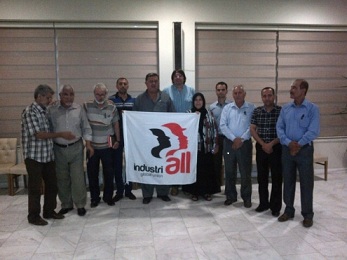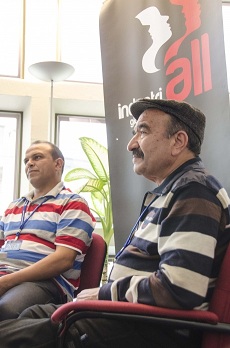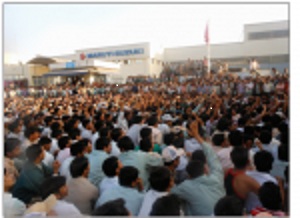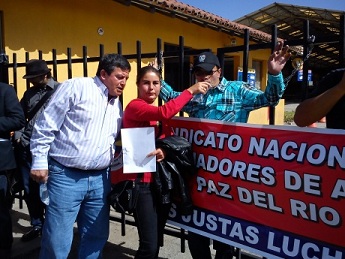| IndustriALL Headlines are produced by IndustriALL Global Union |
Iraq still lacks legislation protecting workers’ rights, guaranteeing freedom of association and governing industrial relations. In an effort to coordinate and consolidate forces, an IndustriALL Global Union National Council was established in Baghdad on July 10.
 |
July 18, 2013: The current legislation, inherited from Saddam Hussein’s regime, rules out the existence of labor unions carrying out free and independent labour union activity. It prohibits independent organizing and collective bargaining in both public and private sectors, as well as prohibiting unions from holding funds, collecting dues, and maintaining assets. There are no provisions for the right to strike, and workers in essential services are explicitly prohibited from striking. In addition, harsh anti-union practices at workplaces through threats, intimidations, kidnappings, torture and murders are not uncommon.
However, in spite of this Iraqis workers have managed to form their own unions. In the last few years, six Iraqi affiliates representing workers in oil, petrochemical and electricity sectors have joined IndustriALL Global Union, and there is a large interest for further affiliation.
Establishing the IndustriALL Global Union National Council is a great step towards joining forces in fighting for trade union legislation. Six Iraqi affiliated trade unions are behind the establishment, and Assistant General Secretary Kemal Özkan was present at the founding meeting.
While in Iraq, Kemal Özkan also met with Mr Osama Al-nujaifi, Speaker of Iraqi Parliament, Mr Nassar Al-Rubuiee, Minister of Labor and Social Affairs, and Mr Kanna Yonadam, Chair of Labor and Social Affairs Committee at the Parliament, discussing the current legislation. Under local and international pressure, the Iraqi government has drafted a new labour law, far below the trade unions’ ambitions.
IndustriALL made it clear that the law must cover the public sector. Legislation should also make it easier to form a union by ensuring that requirements follow ILO norms and standards – trade unions must be allowed to determine and establish their own democratic structures, and the law must provide effective guarantees against interference in trade union movement by government and employers.
The draft legislation is likely to be discussed in hearings in August. IndustriALL Global Union, in cooperation with International Trade Union Confederation (ITUC), Iraqi affiliated trade unions and national centers, is launching a campaign to support the enactment of trade union legislation, as parallel to the draft labor law.
“Our mission was very timely”, says IndustriALL Kemal Özkan. “If the trade union legislation is not adopted now, nobody knows when the next opportunity will be, and we cannot wait years and years for this”.
In the meantime, four Iraqi national centers recently issued a joint statement about interventions and violations carried out by the Ministry of Labor and Social Affairs. The organizations jointly call “for the abolition of these measures and the recognition of the right to freedom of association and protection of trade union organizations without any interference from the government or any other party whatsoever”.
Egypt is currently deeply divided and the path forward is profoundly uncertain. IndustriALL Global Union firmly believes that Egypt’s military must quickly get out of politics and allow a speedy return to democracy under a constitution that ensures the fundamental rights of all.
 |
| Egypt’s new Minister for Labor and Manpower, Kamal Abu Aita. |
July 18, 2013: Following mass protests which began on 30 June and the biggest demonstrations in Egypt’s history with more than 30 million citizens taking to the streets, Egypt’s military intervened on 3 July to remove the elected President Mohamed Morsi from office with promises of a new political roadmap and a quick transition back to a civilian government.
While Western news sources largely describe events as a military coup, secular democratic forces within the country, including the independent trade unions, have loudly proclaimed it to be a popular uprising.
Along with the severe economic and financial situation, the new government is faced with an increasingly alarming security situation as they try to steer the country towards a quick return to civilian rule.
Despite this there are some signs which have potential to accelerate a return to democratic rule. The country’s newly-appointed Cabinet has been recently sworn in. The global union movement considers encouraging the appointment of Kamal Abu Aita, the former president of the Egyptian Federation of Independent Trade Unions (EFITU) as Labour and Manpower Minister. Another important labour-related Ministry of Solidarity and Social Protection has been given to well-known Ahmad El-Borei. There is a hope in the union movement that these two appointments, amongst 33 ministerial positions announced should be a signal to combat mounting poverty and unemployment.
Meanwhile in violence ridden North Sinai province at least three people were killed and 17 wounded on 14 July when suspected militants used rocket-propelled grenades to attack a bus carrying workers employed at a cement factory. The bus was fired on in the city of El Arish. The attack has been strongly criticized by the independent trade union movement and related organisations.
“Egypt is a critically important country in the region,” said IndustriALL Global Union’s General Secretary Jyrki Raina:
“We are very much looking forward to a peaceful and democratic environment whereby citizens, particularly workers can freely exercise their fundamental rights. Our global union will continue to support democratic, free and independent trade unions in the country as the backbone of the civil society.”
 |
Workers at Maruti Suzuki are planning a hunger strike and a sit-in demonstration in Manesar, India, on 18 July. The aim is to free 147 jailed workers.
July 15, 2013: After a violent incident on 18 July last year in which a manager at Manesar plant of Maruti Suzuki India Limited (MSIL) was killed, 147 workers have been held in Gurgaon jail without being granted bail. An additional 66 workers have outstanding non-bailable arrest warrants. 2,300 workers have lost their jobs, and it has been a year where thousands of families have been devastated economically and emotionally.
You can show your support for the workers at Maruti Suzuki by going to LabourStart website.
For more information, please see the report released on 27 June by the International Commission for Labor Rights (ICLR), entitled Merchants of Menace: Repressing workers in India’s new industrial belt, Violations of workers’ and trade union rights at Maruti Suzuki India Ltd.
The action taken by a Gerdau worker in Columbia combined with national and international solidarity have led the company to agree to pay him health insurance for six years.
 |
July 18, 2013: IndustriALL has already reported how a Gerdau worker in Colombia, Luis Cruz, chained himself to the factory gates after being dismissed, even though he had legal protection after suffering a workplace accident in 1994. Dismissal meant the loss of health benefits for himself and his family.
Luis Cruz was chained to the factory gates in Duitama for five days but has now ended his protest after reaching an agreement with the company.
Gerdau agreed to pay health insurance for him and his family for six years, triple the amount of compensation and accept that he can continue with legal action to seek recognition that his health problems resulted from a workplace accident. In addition, Gerdau withdrew the sanctions imposed on the union leadership.
Luis Cruz and the union are grateful for the solidarity shown by the international network. The Gerdau Workers’ World Council and IndustriALL Global Union wrote to the company to support Luis and denounce the dismissals that are taking place at Gerdau factories in Colombia.
IndustriALL welcomes the agreement and reiterates its solidarity with Gerdau workers and their trade union, Sintrametal, in the continuing struggle against the dismissals and the company’s anti-trade union attitude.
On 15 July the ILO launched a new project called “Work in Freedom” to provide women migrant workers from South Asia with a more secure future.
July 18, 2013: The project is funded by the UK Department for International Development to the tune of 9.75 million pounds over five years. The initiative focuses on domestic workers and garment workers. IndustriALL Global Union is a partner in the project.
The aim is to provide the women and girls with practical support and advice to enable them to avoid the pitfalls of trafficking and to contribute to a better lifestyle for their families.
At the meeting held on 15 July in London some success stories were applauded, such as the Nepali trade union centre GEFONT which has set up support committees for Nepali migrant workers in the most important receiving countries, SEWA, the Indian Self-employed women’s association which has successfully organized informal women workers and the Jordanian textile union which also organizes migrant workers.
The ILO Better Work program focuses on garment workers. In Jordan 40,000 people work in the garment sector, 30,000 of whom are migrant workers. 65 per cent of the workers are women. The issues where the Better Work program has made a difference are in stopping the confiscation of documents, the elimination of the nightly curfew, limiting compulsory overtime and changing the recruitment process.
Recently a collective agreement was signed in Jordan, which can be considered to be an achievement for the region. The contract regulates wages, working hours, union representation and dues check-off, while giving the union the opportunity and the responsibility to represent migrant workers.
This contract goes a long way toward ensuring migrant workers’ rights. In Jordan migrant workers have two to three year contracts, whereas Jordanian workers have open-ended contracts. The minimum wage in Jordan is 185 USD per month plus food and accommodation, thus attractive conditions for workers from Bangladesh.
Precarious work aids and abets trafficking. In the meantime industry and consumers are required more than ever to abide by ethical manufacturing principles. This can mean hope for the women who migrate to the Middle East looking for a better life.